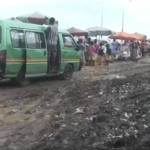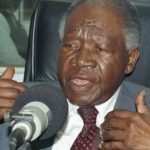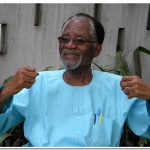Nigeria: Another Do-or-Die Election in the offing?
Posted by By Akogun Akomolafe at 11 April, at 03 : 00 AM Print
Warning: count(): Parameter must be an array or an object that implements Countable in /home/alaye/public_html/wp-content/themes/Video/single_blog.php on line 46
Warning: count(): Parameter must be an array or an object that implements Countable in /home/alaye/public_html/wp-content/themes/Video/single_blog.php on line 56
As they prepare to vote in the 9 April 2011 elections, the prayer on the lips of most Nigerians is that the political earthquakes that toppled the governments in Tunisia and Egypt and is threatening the 42-year old regime of Beloved Brother Leader Qaddafi in Libya, should extend to their much mis-governed land and sweep the otiose elite into a giant seismic dustbin.
We should try to understand their prayer. Few nations in history have been so badly led astray by their leaders like Nigeria. It is equally difficult to imagine another country that has regressed so badly as this West African nation of some one hundred and fifty million souls. And one will have to search far and wide to come across a more insensitive, totally uncaring and corrupt politicians like the shameless lot that continues to grace the Nigerian political scene.
Many (some will say most) Nigerian politicians are not only thieves, but they have absolutely no shame at all. They have elevated corruption to such level that Nigerians are no longer awed or shocked by news of corrupt practices in high and low places. Corruption has become the norm; almost a culture.
One could hardly read a newspaper in Nigeria without coming across mind-boggling cases of corruption here and there. One top politician was recently in the news for organizing a Thanksgiving service in a church after he was released from jail on corrupt practice. Among the societal bigwigs that joined in the celebration was former president Olusegun Obasanjo who reportedly danced himself silly at the church. The public outcry caused Obasanjo to issue a mind-bending statement that he was ‘tricked’ into attending the service. Obasanjo is an elderly Yoruba – a people that once put great premium on honesty and good-conduct.
Ironically, Obasanjo was the president who, during his tenure, made a big song and dance about fighting corruption. He was also the leader that set up the Economic and Financial Crime Commission (EFCC). So baffled was the head of the EFCC, Madam Waziri Farida, by the audacity of Nigerian politicians and civil servants to loot the commonwealth that she suggested psychiatric treatment for them.
So, Nigerians appear to be waiting (and praying) for the spark that will ignite a Tunisian-like revolution in their land. The April poll might provide the incendiary device.
Compared to Nigeria, the North African countries where people took to the streets in millions to protest were pure paradise on earth.
Infrastructure-wise both Tunisia and Egypt are light years ahead of the country that, until few years ago, used to boast of being the’ Giant of Africa.’
Life is both short and brutish in today’s Nigeria. Armed robbery is on the increase and although it has somewhat reduced, kidnapping remains a fertile occupation for restless youth who see no other prospect in life. And to compound the security woes, bomb blasts are going off in several parts of the country with the corrupt-ridden and inefficient security agencies reduced to scratching their heads and issuing empty bombast.
As that were not enough, religious dimensions have been added to the pot-pourri of problems besetting the country.
After looting their state’s treasury, almost all the governors of the Northern states tried to appease their people by throwing religion into their faces. Contrary to the spirit and letter of the Nigerian constitution, these governors went ahead and introduced Islamic Sharia laws in their domain. Today, emboldened Islamic fundamentalists are clamoring that Sharia be extended all over the constitutionally-secular federation.
Moslem fundamentalists have wrought mayhem in several Northern states as they strive to impose their fire-brand version of Islam. They have been joined by fellow religionists from neighboring countries to wreaked havoc across Northern Nigeria. Today life in the once-peaceful and serene city of Jos has been ruined by religious and inter-ethnic strife.
For many Igbos, it is déjà vu all over again as, once again, they are made to receive and bury dead relations whose only crime was to sojourn in other parts of what is supposed to be their fatherland. The Pan-Yoruba militant organization, Oodua People’s Congress (OPC), was also sufficiently miffed by the killings of Yorubas in the North that it issued statements re-instating its call for a break-away Odua Republic.
On the economic front, Nigerians are also bemoaning their fate as their standards of living continue to plummet. The national infrastructures are also collapsing with road arteries becoming huge national embarrassments, despite colossal amount been voted for their maintenance and rehabilitation. And despite huge sums being voted, at least on paper, the nation’s electricity generation and distribution system remain epileptic.
In today’s Nigeria, about the only lucrative business in town apart from criminal activities seem to be politics. So debased is the societal value that today many Nigerians join politics not to try and make a difference but rather to partake in the free-for-all looting of public funds.
It is difficult to blame them though when politics pay far more than any other profession. For example, the Chairman of a local government council (the equivalent of the District Chief Executive in Ghana) earns more than a university professor, and he has a fleet of cars at his disposal. His wife also receives a salary and a car. Nigerian lawmakers are believe to be the highest pay in the world with the President of the Nigerian Senate earning as much as four times the salary of the President of the United States of America.
No one talk of ideology anymore in Nigerian politics. The result is that the nation’s twenty one registered parties are distinguishable only by the personalities rather than any ideological differentiation. Politicians cross carpet with abandon dragging their foot-soldiers along with them. Politics has been reduced to mere noise generation. It has become a farcical game whereby politicians mouth nonsense which no one expects them to keep.
The ruling People’s Democratic Party (PDP) which claims to be Africa’s largest political organization is a motley collection of very strange bed-fellows. Given the rancorous manner it ruthlessly prosecute its congress, no one can accuse the party of been an epitome of democracy and Nigerians will scoff at the very idea that the PDP has any feeling for the hoi-poloi.
On its website http://www.peoplesdemocraticparty.net, the PDP boasts that it will:
• make fundamental break with past mistakes in order to realize the optimum potentials of the Country;
• build a qualitatively better society based on the principles of democracy, human rights and social justice under the rule of law;
• be committed to;
• restructuring Nigeria in the spirit of true federalism and responsible tiers of government, so as to achieve a just and equitable society;
• Resolving such fundamental issues as proper devolution of powers between the three tiers of government;
Close to twelve years at the helm, Nigerians rightly wondered what the PDP has done to fundamentally break with past mistakes; what it has done to restructure the country to devolve power between the three tiers of government. In fact, only a die-hard PDP supporter will be able to mention a single thing the party has achieved.
If Nigerians expected the twelve years of PDP mal-administration to galvanise the opposition to coalesce and provide a united front, they were to be sorely disappointed. But they need not be as the political class has, over the years provided ample proof that they are mere political jobbers looking for where their bread will receive the most butter.
Nigerians even have a name for their special brand of politicians – they call them ‘chop-I-chop.’ Little wonder that the nation remains bogged down in cesspit of corruption.
Today, the so-called opposition (largely made up of disgruntled PDPers and other carpet-baggers) offer the long-suffering people of Nigeria no clear alternative to the reprobate PDP.
Sadly for Nigerians, rather for the opposition to present a united front to confront the PDP, they have allowed their selfish interests to becloud their sense of good judgment. No fewer than eighteen (yes, 18) candidates have been approved by the Independent Electoral Commission (INEC) to contest the April poll.
Nigerians believe that most of the candidates are mere reckless opportunists jostling for relevance so that their perfidious acts could be rewarded with a ministerial, ambassadorial or other juicy posts which is passport to good living in a country where politics is the only gainful game in town.
It has been known to happen. The calculation is simple: it’d be difficult for any of the candidates to win outright in the clouded first round which leaves the ‘also-rans’ to declare for the candidate with the best chance with their ‘teeming’ supporters.
That is after they must have made the customary noises about rigging and threatening fire and brimstone, plus all the necessary shakara that’s necessary to increase their nuisance value and boost their chances of getting a post.
Nigerians certainly deserved a lot better than the current sorry motley collection of politicians. Part of the problem was the political system the country chose to operate. Post-independence Nigeria started life with a parliamentary system of government. However, its fragility was believed partly responsible for the collapse of the First Republic when the Army struck on January 15, 1966.
Naturally, the military ran a highly centralised government and this must informed their decision to opt for American-styled Executive Presidency when they took their leave.
It was the inimitable Osagyefo Kwame Nkrumah who defined Western-styled democracy as competition between oligarchies. Whatever its advantages, Executive Presidency is a political system that is inherently expensive to run and manage.
Only few Nigerians have the bag loads of raw cash necessary to prosecute and win elections even at the local government level. Anyone thinking of pursuing elective post at any level needs vast war chest. This has created the chance for those with serious money to start the very lucrative business of sponsoring candidates to high office. So-called God-fathers have stepped in. In order to protect their investment, these money-bags also have army of foot-soldiers (mostly unemployed youth) they can deploy to snatch ballot boxes, beat up or killed opponents and do everything to ensure that sponsored candidates ’win’ elections.’ That explain why in Nigeria some politicians can tell electorates that ‘whether you vote for me or not, I’ll win the election.’
In return the god-fathers want to have some of their men appointed to choice ministries and other parastatals in addition to being awarded juicy government contracts.
God-fatherism has now become part of the country’s political establishment. Many state governors have been made and marred by these entrepreneurs who expected good returns on their ‘investments.’ The result is government that is held hostage and paralysed by its beholden not to electors but to a cabal of very ruthless, faceless individuals who control all levers of government. This has transformed the very art of governance into a do-or-die affair and make it possible for the Nigerian landscape to resemble a gigantic recycling plant with the same, tired, old and ugly faces putting up appearances all the time.
The hijacking and subsequent bastardisation of the body politics make the task of organizing credible elections quite onerous, if not impossible. It is difficult to imagine how the nation hopes to organize credible elections without a radical reformation of the rotten electoral system.
Until there is a fundamental re-jiggering of the extant system, Nigerians should not hope to see any change anytime soon.
Given the abysmal performance of the ruling PDP, nothing would have made better sense than for the opposition politicians to rally behind a single candidate to confront the PDP behemoth. No one expect the PDP not to attempt to rig the forthcoming elections, but even the party of the Apostles of do-or-die politics would have a hard time convincing Nigerians that they cleanly defeat a united front. After twelve years in power, the PDP have a lot on convincing to do to make Nigeria believe that the party has anything new to offer.
Unlike in the 1999 and 2003 elections when the Opposition presented a united front, today incumbent president Goodluck Jonathan goes into battle against a clearly divided opposition. Self-seeking and opportunistic opposition leaders bicker among themselves rather than confront the PDP.
As political scientist and commentator, Prof. Dickson Usoren, opines “an easy passage has been inadvertently packaged for the PDP and its candidate by the caliber of presidential candidates of other parties.”
It’d have been palatable were the opposition to be divided on ideological lines, but no, the motley collections that got registered as political party are oriented towards their leaders who, invariably are also the chief sponsors.
And since ideology has no discernible relevance in the nation’s polity, Nigerians are not convinced that the opposition parties offer them anything new or that they are better than the PDP they are fighting to replace. To many Nigerians, the so-called opposition parties are just the other side of a bad coin.
Although overcrowded, serious money put the April presidential contest as a straight fight between incumbent and PDP candidate Goodluck Jonathan, and the All Nigeria’s Peopels Party (ANPP) candidate, former military strongman, General Mohammadu Buhari. Very interestingly, it pities the country geographic South against the North; and, in a country where religion is a matter of life and death, Christianity against Islam.
PDP – Goodluck Jonathan
Much has been written about President Goodluck Jonathan fairy tale foray into Nigeria’s politics and the April polls offer him the opportunity to prove his mettle. It will the president’s first attempt to win any election on his own merit. Until now, he was always someone’s deputy before providence intervened to catapult him to the number one position. He was a deputy governor in his oil-rich Bayelsa State when his boss DSP Alameseigha was impeached for corrupt practice. Goodluck stepped into the governorship seat automatically.
It was from there that he was plucked to partner with the late President Musa Yar’Adua in the 2007 elections. A sickly Yar’Adua died in May 2010 and Goodluck Jonathan became Nigeria’s substantive president, again without any effort on his part.
His almost one year in office has been most unremarkable. No one has any clue what the president stands for. Although he claims to be hip and maintains a Facebook presence, he has failed to articulate properly what vision he has for the country outside of his party’s dry mantra. A leaked memo published by Wikileaks tells of a man of grave self-doubt, unsure of himself and one who honestly confessed his inexperience.
The president has also been severely criticized for his management of the economy and the deteriorating security situation in the country.
While there is no doubt that he will win handily in his South-South geographic area, the president will have a herculean task to sell himself in the other parts of Nigeria. His bruising battle in the primaries of his PDP party leaves a lot of bitter rancor which are still festering. Although he won the primary handily, few weeks to the poll, his main opponent, former Vice President Atiku Abubakar, is still in the courts pursuing a case against his loss.
Also, the influential Northern political elite, which believes that the president cheated by even putting himself up, contrary to their party’s zonal agreement, are still visibly angry and have not come out to endorse him.
Despite his handlers touting him as Nigeria’s first Ph.D holding president, he recently revealed that he still has yet to master the fundamentals of politicking. He committed a major faux pas when, in his campaign tour of the Yoruba West, he called on his party faithful to wrest power from whom he described as ‘rascals.’
This un-presidential outburst naturally did not go down well with the Yoruba governors, two of who recently have their mandates restored to them by the courts after protracted legal battles. They translated the president saying as insult on their parents. Insulting someone’s parent is not a small crime in Yorubaland.
The Igbos are placed in the unenviable position of making a difficult, almost impossible choice. Culturally they are closest to Jonathan’s Ijaw people, but theirs remain a choice that requires Solomonic wisdom.
Since they fought and lost the Biafran war, they have suffered gross marginalization and no Igbo has had a shot at the presidency. Their calculation is that one of them should become president after the 2015 elections. Its actualization is every Igbo over-riding concern and it is proving not to be an easy one.
By the zoning arrangement of the PDP, a Southerner cannot succeed Goodluck Jonathan. This effectively rules out the Igbos contesting the 2015 elections under the aegis of the PDP.
Thus, the dilemma facing the Igbos remains: If they support Goodluck Jonathan and he wins, they can kiss their 2015 presidential ambition goodbye. And if they choose not to support their kinsman, they risk being accused of perfidy, which will come to haunt them in years to come as people will perceive them as treacherous and unreliable.
CPC – Mohammadu Buhari
Since he overthrew the government of President Shehu Shagari in the December 1983 coup, General Mohammadu Buhari has being a recurrent feature of the Nigerian political scene. A retired General who refused to get tired, General Buhari has become an almost serial Presidential candidate. He contested and lost the 2003 and 2007 elections. Undaunted he doggedly litigated his loss also to no avail.
Although his 20 month reign was characterized by massive human right abuses, few will write the stern disciplinarian off lightly.
On the plus side, Buhari has one or two things going for him: First, he comes from the North, a fact that still counts for a lot in Nigeria’s political equation. Also, as of the time of writing, the PDP has not successfully healed the internal rift occasioned by the party’s primary, and the grapevine is rife with rumours of the Northern political elite rallying behind the Daura-born General, in order to scuttle Goodluck Jonathan’s ambition, and ensure that the presidency comes back to the North.
No one can accuse the Northern Establishment of not knowing how to prosecute its political agenda, and this must be giving the president’s handlers some headache. Were the North to present a united front in the person of General Buhari, it’ll dramatically alter all permutations, despite the boast by Vice-President Sambo’s boast that Buhari is a spent force.
Many Nigerians believe that Buhari is the only politicians that can help sanitise the nation’s body polity. He’s generally seen as an incorruptible and highly disciplined person. He has also shrewdly selected a Yoruba running mate, and has pledged to support an Igbo candidate in 2015.
On the flip side, many Nigerians still remember life under Buhari which was characterized mainly by high-handedness and application of laws retroactively. Many, especially in the South, consider him a tribal as well as a religious bigot. His rule saw many Northern politicians escaping his dragnets whilst many Southerners were carted into jails. Many Yorubas will not easily forgive him for the humiliation he visited on many prominent Yorubas especially the late Papa Ajasin.
Many Nigerians still bear huge grudges against the former military ruler. Among them is Nobel laureate, Wole Soyinka, who felt so affronted by Buhari’s candidature that he wrote a trenchant 10-point reasons why Nigerians should not vote for Buhari.
Soyinka railed: “The grounds on which General Buhari is being promoted as the alternative choice are not only shaky, but pitifully naive. History matters. Records are not kept simply to assist the weakness of memory, but to operate as guides to the future. Of course, we know that human beings change. What the claims of personality change or transformation impose on us is a rigorous inspection of the evidence, not wishful speculation or behind-the-scenes assurances. Public offence, crimes against a polity, must be answered in the public space, not in caucuses of bargaining. In Buhari, we have been offered no evidence of the sheerest prospect of change. On the contrary, all evident suggests that this is one individual who remains convinced that this is one ex-ruler that the nation cannot call to order. Buhari – need one remind anyone – was one of the generals who treated a Commission of Enquiry, the Oputa Panel, with unconcealed disdain. Like Babangida and Abdusalami, he refused to put in appearance even though complaints that were tabled against him involved a career of gross abuses of power and blatant assault on the fundamental human rights of the Nigerian citizenry.”
Vintage Soyinka, come April 11 2011, Nigerians will have the chance to prove Soyinka right or wrong.
Plug for Femi Akomolafe books
Femi Akomolafe is a Freelance writer, Author, Film & Video Documentary Producer, IT Consultant and Web-Designer.
His highly-acclaimed books (Africa: Destroyed by the gods,” and “Africa: It shall be well,” are now available for sales at the following bookshops/offices:
- Freedom Bookshop, near Apollo Theatre, Accra.
- The Daily Dispatch Office, Labone – Accra
- WEB Dubois Pan-African Centre, Accra
- Ghana Writers Association office, PAWA House, Roman Ridge, Accra.
- African Kitchen in Amsterdam Bijlmer
Where to buy them online:
Africa: it shall be well on Kindle books: https://www.createspace.com/4820404
Africa: it shall be well on Amazon books: http://goo.gl/QeFxbl
Africa: Destroyed by the gods on Kindle books: https://www.createspace.com/4811974
Africa: Destroyed by the gods on Amazon books: http://goo.gl/1z97ND
Get free promotional materials here:
- Africa: it shall be well: http://alaye.biz/africa-it-shall-be-well-introduction-in-pdf/
A FREE Chapter of ‘Africa: It shall be well’ could be downloaded here: http://alaye.biz/africa-it-shall-be-well-a-free-chapter/
- Africa: Destroyed by the gods (How religiosity destroyed Africa) http://alaye.biz/africa-destroyed-by-the-gods-introduction/
A FREE Chapter of ‘Africa: Destroyed by the gods’ could be downloaded here: http://alaye.biz/africa-destroyed-by-the-gods-free-chapter/
Femi’s blog: www.alaye.biz/category/blog ; Website: www.alaye.biz
Femi on Amazon https://www.amazon.com/author/femiakomolafe
Twitter: www.twitter.com/ekitiparapo ;Facebook: www.facebook.com/ Femi Alaye
Gmail+: www.google.com/ +Femi Akomolafe; LinkedIn: www.linkedin.com/ Femi Akomolafe
Email: fakomolafe@gmail.com;
Kindly help me share the books’ links with your friends and, grin, please purchase your copies.
Comradely,
Femi Akomolafe




